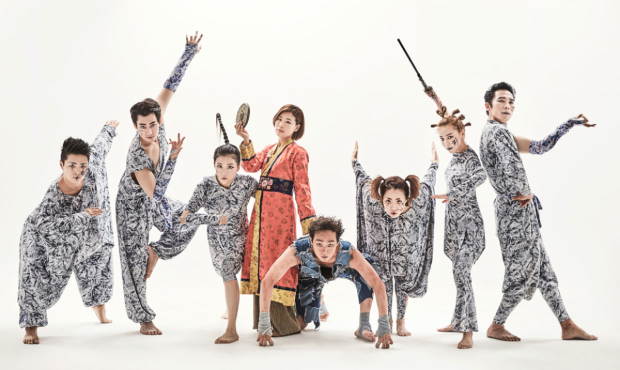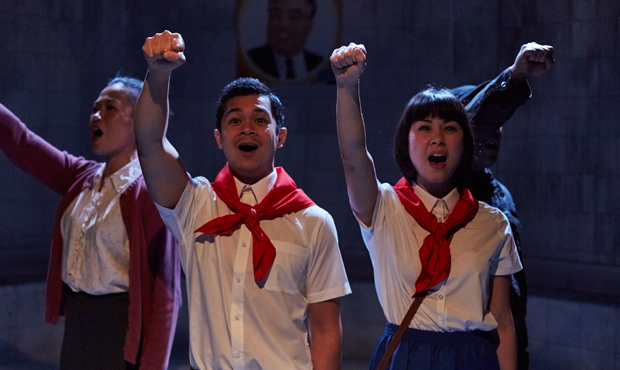An introduction to Korean theatre at this year's Fringe

Ginny Kim is an agent and producer. She has been involved in the Korean theatre industry for over a decade, participating in various play and musical productions including Singin’ in the Rain (Chungmu Art Center) and In the Heights (Blue Square). She also works for Korea’s leading entertainment company S.M. Entertainment.
She has recently worked on translating the musical Kiss of the Spider Woman for the professional Korean production in 2018, and bringing the Korean physical comedy musical Behind the Mirror to the Edinburgh Fringe this year.
When I first visited Edinburgh in 2007, I was eager to see Korean shows, but it was challenging to find them among the thousands of productions. Those I found were all traditional dance or music pieces that I was not tempted to watch. However, my next visit in 2015 was rather different as there was a program called 'Korean Season' in the Assembly theatre, one of the biggest venues in Edinburgh. I started to wonder what had changed.
Over the last few decades, the Korean theatre industry has become very competitive, with a huge number of productions each year including licensed musicals and plays, running alongside our own theatre productions. Seoul has roughly 300 large and small-scale theatres that run all year round.
Every year the number of big musical productions increases but the small and medium-scale theatre companies struggle to find their audience. As an alternative, the companies started to look into developing international markets.
When they first tried to export the shows, Korean companies depended on traditional dance or physical theatre, also known as ‘non-verbal’ shows to overcome the language barrier. This started with the success of NANT, a non-verbal comedy show set in a kitchen that incorporates traditional samul nori rhythm, which came to the UK in 1999 – followed by another sold-out physical comedy called JUMP. JUMP now has its own permanent theatre in Seoul and has toured throughout Europe, Asia and America. Since the show’s international success, there have been a dominant number of physical theatre Korean shows at the Fringe. This has evolved each year resulting in blending various elements on the stage.
Strong drama is prevalent in the Korean creative industry, exemplified by the movies and TV shows that have made their names abroad. Unlike those screen-based art forms, however, Korean performing arts have struggled to deliver the same level of drama internationally due to the inevitable language barrier.
This year, there are even more shows in the mould of JUMP and NANT. SNAP is a show that embraces magic, taking a physical performance format with ingenious stage language, mime and comedy. A traditional physical performance, TAGO takes a mixture of Korean traditional instruments, from gigantic drums to small percussion, spiced up with a hint of martial arts.
These types of shows have also paved the way for the newer, more contemporary works which are coming to the Fringe this year demonstrating more of what present-day Korean theatre is about. Mind-Goblin, by performance artist Lee Kyung Eun rebels against the idea of the typical female dancer in a contemporary dance show combining traditional, shamanistic music with an intense dance style. It is part of the current shift into finding a way to deliver a sometimes complex story that can be universal. MAC Company is bringing two shows about traditional Korean beliefs and folklore to the Fringe, but with a modern presentation; Binari, directed by Jungnam Lee is about a woman who has reached the end of her life but cannot leave the world in peace. It incorporates Korean folk songs, rituals and dances. Kokdu showcases Korean shamanistic rituals, centring around a Kokdu, which is a traditional wooden totem which guides the deceased to the afterlife.
This year my company will bring two shows using subtitles to the Fringe: a musical that has had huge success over the last decade in Korea called Behind the Mirror (2 to 13, 15 to 28 August), a physical comedy aimed at families, about a maid who steals the mirror of a princess inspired by the traditional Korean tale of the princess PyeongGang, who turned an ordinary guy into a general. The multi-award-winning MEDEA on Media (2 to 28 August) uses the Greek tragedy of Medea, who betrays her family for love, and harnesses different mediums of TV to explore a post-truth world.











